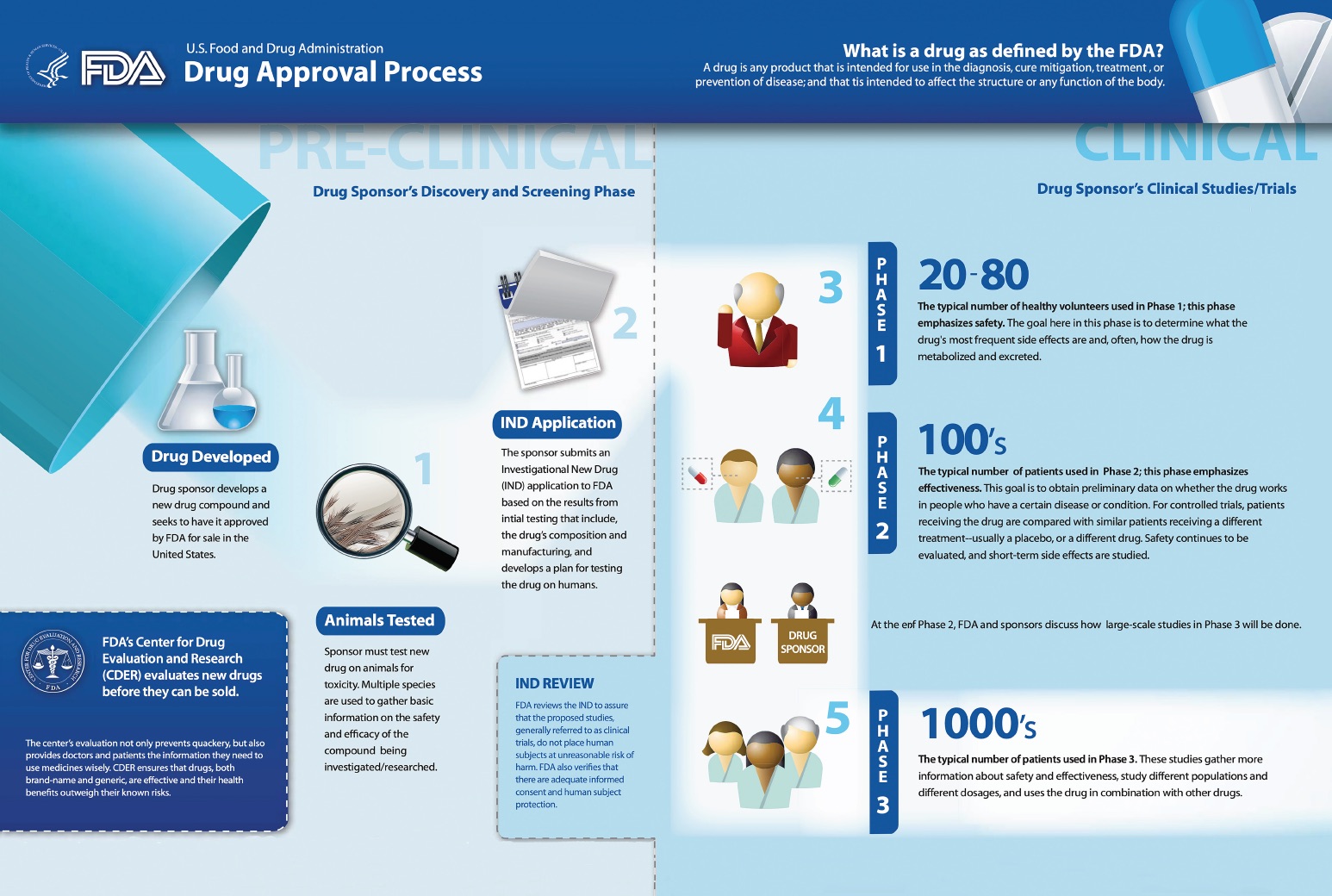About Clinical Trials

What is a Clinical Trial?
A clinical trial is a research study that tests new ways to prevent, detect, or treat diseases in people. The goal of these trials is to see if an intervention is safe and effective before it is available to the greater public. Clinical trials are at the heart of medical advancement and are the starting point for prevention and treatment of diseases.
Learn more about vaccines and how they are developed here:
Drug Approval Process

A downloadable PDF version of this poster is available on the FDA website
FDA's Center for Drug Evaluation and Research (CDER) evaluates new drugs before they can be sold. The center's evaluation not only prevents quackery, but also provides doctors and patients the information they need to use medicine wisely. CDER ensures that drugs, both brand-name and generic, are effective and their health benefits outweigh their known risks.
Preclinical
Drug Sponsor's Discovery and Screening Phase
Drug Developed
Drug sponsor develops a new drug compound and seeks to have it approved by FDA for sale in the United States.
Animal Tested
Sponsor must test new drug on animals for toxicity. Multiple species are used to gather basic information on the safety and efficacy of the compound being investigated/researched.
IND Application
The sponsor submits an investigational New Drug (IND) application to FDA based on the results from initial testing that include, the drug's composition and manufacturing, and develops a plan for testing the drug on humans.
IND Review
FDA reviews the IND to assure that the proposed studies, generally referred to as clinical trials, do not place human subjects at unreasonable risk of harm. FDA also verifies that there are adequate informed consent and human subject protection.
Clinical
Drug Sponsor's Clinical Studies/Trials
Phase 1: 20-80
The typical number of healthy volunteers used in Phase 1; this phase emphasizes safety. The goal here in this phase is to determine what the drug's most frequent side effects are and, often how the drug is metabolized and excreted.
Phase 2: 100's
The typical number of patients used in Phase 2; this phase emphasizes effectiveness. This goal is to obtain preliminary data on whether the drug works in people who have a certain disease or condition. For controlled trials, patients receiving the drug are compared with similar patients receiving a different treatment--usually a placebo, or a different drug. Safety continues to be evaluated, and sort-term side effects are studied.
Between Phase 2 and Phase 3
At the end of Phase 2, FDA and sponsors discuss how large-scale studies in Phase 3 will be done.
Phase 3: 1000's
The typical number of patients used in Phase 3. These studies gather more information about safety and effectiveness, study different populations and different dosages, and uses the drug in combination with other drugs.
What is a drug as defined by the FDA?
A drug is any product that is intended for use in the diagnosis, cure mitigation, treatment, or prevention of disease; and that is intended to affect the structure or any function of the body.
Commonly Used Terms
These terms are often used in our Informed Consent Forms and at study visits.
Studies in which you do not know which medicine is being used. In a double-blind study, neither you nor the research team are told what you are being given to reduce bias (If medically necessary, it is always possible to find out which intervention you are receiving).
Controlled means that volunteers are split into at least 2 groups: those receiving the study intervention being tested and those either receiving standard intervention for the condition, no intervention, or a placebo.
A doctor who leads the clinical research study team and regularly monitors the health of volunteers to determine the study's safety and efficacy.
An inactive substance that looks the same, and is administered in the same way as, the study intervention in a clinical trial.
The company or individual that takes responsibility for and initiates a clinical trial.
Check out our Enrolling Studies page to find a study that is right for you!